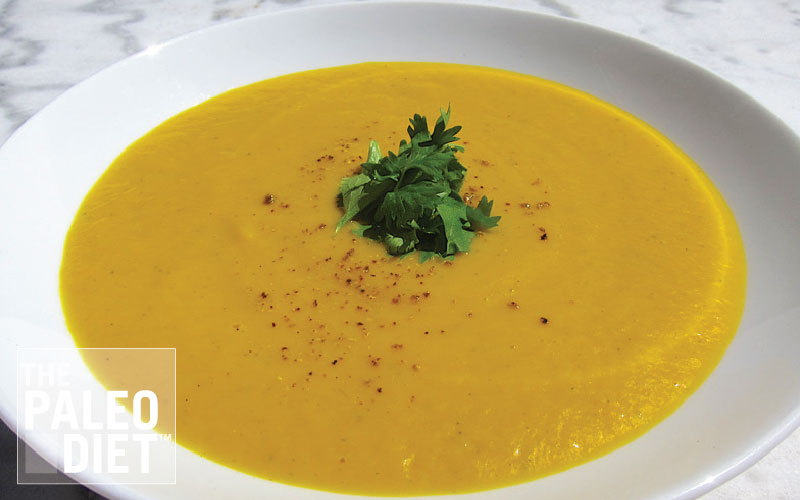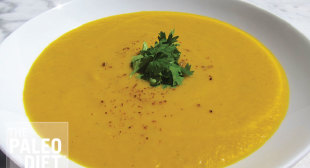Carrot Coconut Lemongrass Soup, An Athlete-Friendly Weight Loss Recipe

In The Paleo Diet for Athletes, we lay out a comprehensive dietary strategy for performance athletes based on the principles of the Paleo Diet, but with minor adjustments.1
Athletes push themselves to physiological extremes rarely experienced by our distant ancestors. Accordingly, they have slightly different nutritional needs compared to non-athletes.
Meals consumed before training should be higher in carbohydrates, lower in fiber, and should be very hydrating.2
Additionally, these meals should include some source of protein. Our Carrot Coconut Lemongrass Soup alongside a serving of wild Alaskan salmon is a complete, excellent pre-workout meal.
Carrots are starchy, relatively high-carb vegetables containing significant amounts of water; when broken down through digestion, they are very hydrating.
Consuming adequate liquids prevents protein breakdown during training, thereby enhancing performance and recovery.3
Besides creating lavish textures, we’re blending the soup, which disrupts the fiber content of the carrots.
A study of the plasma-glucose effects of three forms of apples—whole, juiced, and blended—concluded,
“The removal of fiber from food, and also its physical disruption, can result in faster and easier ingestion, decreased satiety, and disturbed glucose homeostasis which is probably due to inappropriate insulin release.”4
For an athlete’s pre-workout meal, soups have their advantages.
Whole vegetables are generally better than fiber-disrupted purées, but occasionally it’s great to enjoy the textures afforded by modern technology.
I would recommend this soup for your next dinner party, especially when hosting guests who are unfamiliar with the Paleo lifestyle.
This soup is a definite crowd-pleaser, no matter which section of the crowd one might be sitting.

Ingredients
Method
- prepare the lemongrass, remove the outer layers, trim the stems, and cut an inch or two from the tops.
- Chop the remaining parts of the lemongrass finely.
- Prepare the onion, garlic, and ginger.
- Put the onion, garlic, ginger, lemongrass, carrots, coconut milk, and Kaffir lime leaves in a pot. If using lime juice instead of Kaffir leaves, don’t add now. Add enough water to cover, bring to boiling, reduce heat, cover, and simmer for about 20 minutes.
- Add the zucchini and more water if necessary; the liquid should just be covering the vegetables. We add the zucchini later, after the carrots, because the carrots need more cooking time and we don’t want to overcook the zucchini. Continue simmering for another 15 minutes. When the vegetables are tender, remove from the heat and let cool. The cooling time depends on your blender and whether it can handle hot liquids. Most high-speed blenders can, whereas standard blenders do better with cooled liquids. Begin processing the soup into a creamy consistency. You’ll probably have to work in batches. If using lime juice instead of Kaffir, add now.
- To serve, garnish with freshly chopped cilantro.
Christopher James Clark, B.B.A.
Christopher James Clark, B.B.A. is a writer, consultant, and chef with specialized knowledge in nutritional science and healing cuisine. He has a Business Administration degree from the University of Michigan and formerly worked as a revenue management analyst for a Fortune 100 company. For the past decade-plus, he has been designing menus, recipes, and food concepts for restaurants and spas, coaching private clients, teaching cooking workshops worldwide, and managing the kitchen for a renowned Greek yoga resort. Clark is the author of the critically acclaimed book, Nutritional Grail.
References
1. Cordain, L. & Friel, J. (2012). The Paleo Diet for Athletes: The Ancient Nutritional Formula for Peak Athletic Performance. Rodale Books; revised edition.
2. Ibid.
3. Ibid.
4. Haber, G.B., Heaton, K.W., Murphy. D., & Burroughs L.F. (1977). Depletion and disruption of dietary fibre. Effects on satiety, plasma-glucose, and serum-insulin. The Lancet, 2(8040), 679-82.